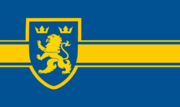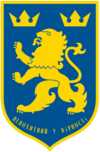Ravka: Difference between revisions
No edit summary |
No edit summary |
||
| Line 5: | Line 5: | ||
|image_flag = [[File:RavkaFlag4.png|180px]] | |image_flag = [[File:RavkaFlag4.png|180px]] | ||
|alt_flag = | |alt_flag = | ||
|image_coat = [[File:RavkaCOA5.png| | |image_coat = [[File:RavkaCOA5.png|100px]] | ||
|alt_coat = | |alt_coat = | ||
|national_motto = ''Непохитний у вірності'' | |national_motto = ''Непохитний у вірності'' | ||
Revision as of 00:43, 1 May 2023
Ravkan Republic Равканська Республіка | |
|---|---|
| Motto: Непохитний у вірності | |
| Capital and largest city | Myropol |
| Official languages | Ravkan |
| Recognised regional languages | Veleti Górskan |
| Demonym(s) | Ravkan |
| Government | Unitary Parliamentary republic |
| Area | |
• Total | 835,989 km2 (322,777 sq mi) |
| Population | |
• 2022 census | 110,134,503 |
| Currency | Lei (₳) (RL) |
| Date format | dd-mm-yyyy CE |
| Driving side | right |
| Calling code | +67 |
| ISO 3166 code | RVK |
| Internet TLD | .rvk |
Ravka, officially the Ravkan Republic (Ravkan, is a country located in southern central Eracura. It is bordered to the north by Acrea and to the west by Drazhynskia. Its southern coast borders the Sundering Sea. Ravka has a primarily temperate climate, with a warm mediterannean coast along the Gulf of Seyne to the southeast.
The earliest recorded inhabitants of Ravka are a combination of proto-Slavic, proto-Nordic, and proto-Latin tribes. By the first millennia BCE, proto-Slavic tribes made up the largest ethnic group in modern-day Ravka. The region came under the control of the Acrean Empire around 120 BCE, and remained a core territory of the Acrean Empire throughout its existence. Its early integration into the Empire placed the Ravkan elite in a favourable position relative to other non-Nordic cultures that had been integrated into the Empire, and uniquely so among Slavic groups. During the Empire's dissolution, Ravka fractured into numerous polities generally ruled by dominant local noble or mercantile families. They remained separate until

